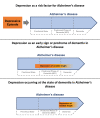Depression-an underrecognized target for prevention of dementia in Alzheimer's disease
- PMID: 32433512
- PMCID: PMC7239844
- DOI: 10.1038/s41398-020-0839-1
Depression-an underrecognized target for prevention of dementia in Alzheimer's disease
Abstract
It is broadly acknowledged that the onset of dementia in Alzheimer's disease (AD) may be modifiable by the management of risk factors. While several recent guidelines and multidomain intervention trials on prevention of cognitive decline address lifestyle factors and risk diseases, such as hypertension and diabetes, a special reference to the established risk factor of depression or depressive symptoms is systematically lacking. In this article we review epidemiological studies and biological mechanisms linking depression with AD and cognitive decline. We also emphasize the effects of antidepressive treatment on AD pathology including the molecular effects of antidepressants on neurogenesis, amyloid burden, tau pathology, and inflammation. We advocate moving depression and depressive symptoms into the focus of prevention of cognitive decline and dementia. We constitute that early treatment of depressive symptoms may impact on the disease course of AD and affect the risk of developing dementia and we propose the need for clinical trials.
Conflict of interest statement
The authors declare that they have no conflict of interest.
Figures





References
-
- World Health Organization. The Global Burden of Disease: 2004 Update 1–160 (World Health Organization, 2008). http://www.who.int/healthinfo/global_burden_disease/GBD_report_2004updat...
-
- Prince M, et al. The global prevalence of dementia: a systematic review and metaanalysis. Alzheimer’s Dement. 2013;9:63–75. - PubMed
-
- Prince M. et al. World Alzheimer Report 2015: The Global Impact of Dementia. An Anlaysis of Prevalence, Incidence, Costs and Trends. Alzheimer’s Disease International. https://www.alz.co.uk/research/WorldAlzheimerReport2015.pdf. (2015).
-
- Livingston G, et al. Dementia prevention, intervention, and care. Lancet. 2017;390:2673–2734. - PubMed
-
- World Health Organization. Risk Reduction of Cognitive Decline and Dementia: WHO Guidelines 1–96 (World Health Organization, Geneva, 2019). https://www.who.int/mental_health/neurology/dementia/guidelines_risk_red.... - PubMed
Publication types
MeSH terms
LinkOut - more resources
Full Text Sources
Medical

